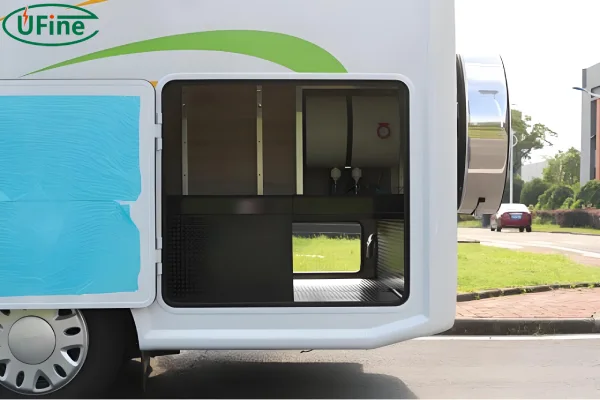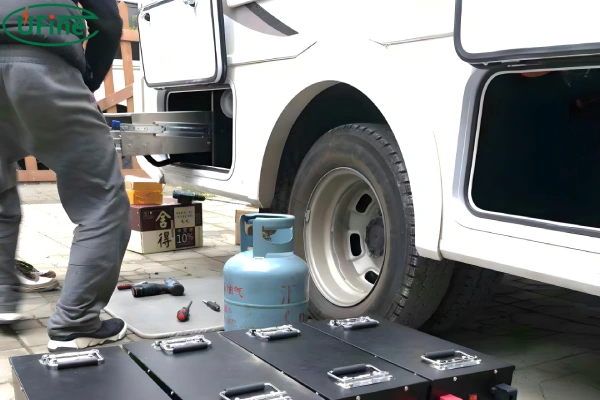When it comes to enjoying the freedom of the open road in your motorhome, having a reliable power source is essential. Lithium ion batteries have emerged as the top choice for motorhome enthusiasts due to their superior performance, longevity, and efficiency. In this comprehensive guide, we’ll explore what makes a great motorhome battery, how lithium ion batteries work, and everything you need to know to make an informed decision.
Part 1. What does your motorhome battery need to meet?

A motorhome battery must satisfy several key requirements to ensure it functions effectively in the unique environment of a motorhome. Here’s what you should look for:
- Reliability: Your motorhome battery should consistently provide power for all your needs. Whether you’re running lights, appliances, or electronic devices, you need a battery that won’t let you down.
- Durability: Motorhomes experience a lot of vibrations and bumps on the road. Therefore, your battery needs to be rugged and able to withstand these conditions without suffering damage or performance loss.
- Capacity: The battery must have enough capacity to power all your devices and appliances for extended periods, especially if you plan on boondocking or staying off-grid.
- Fast Charging: When you’re on the go, downtime is a luxury you can’t afford. A good motorhome battery should recharge quickly, allowing you to get back on the road with minimal delay.
- Low Maintenance: You want to enjoy your travels, not spend time maintaining your battery. Opt for a battery that requires minimal upkeep so you can focus on your adventures.
Part 2. How does the lithium ion battery for motorhome work?
Lithium ion batteries are known for their efficiency and reliability, making them an excellent choice for motorhomes. Here’s a closer look at how they operate:
- Energy Storage: Lithium ion batteries store electrical energy in a chemical form. This energy is stored in lithium iron phosphate cells, which are known for their stability and safety.
- Power Delivery: When you need power, the battery converts the stored chemical energy back into electrical energy. This process is highly efficient, ensuring that you get the maximum power output.
- Recharge Cycle: Lithium ion batteries can be recharged quickly. When connected to a power source such as a generator, solar panels, or shore power, these batteries rapidly store energy for future use. This quick recharge capability ensures that you always have power when you need it.
The efficiency of lithium ion batteries in energy conversion and storage makes them ideal for motorhomes, providing a reliable power source for all your needs.
Part 3. Voltage
One of the critical aspects of choosing a lithium ion battery for your motorhome is understanding the voltage requirements. Common voltages for these batteries include:
- 12V Batteries: These are the most standard and widely used in motorhomes. A 12V battery provides ample power for most basic electrical needs, including lighting, small appliances, and electronics.
- 24V Batteries: Some larger motorhomes or those with more demanding electrical systems may require 24V batteries. These offer more power and can be beneficial for running multiple high-draw appliances simultaneously.
The choice of voltage depends largely on your motorhome’s electrical system and your specific power needs. Most motorhome setups are designed to work with 12V batteries, but if you have a more power-intensive setup, a 24V battery might be more suitable.
Part 4. Capacity
Battery capacity is a crucial factor in determining how long your battery can power your motorhome before needing a recharge. Capacity is measured in ampere-hours (Ah) and indicates the amount of energy a battery can store.
Here’s what you need to know about capacity:
A battery’s capacity tells you how much energy it can hold. For instance, a 100Ah battery can deliver 1 amp of current for 100 hours or 10 amps for 10 hours.
Common Capacities:
- 100Ah Batteries: These are suitable for light to moderate energy needs. They can power basic appliances and electronics for shorter durations.
- 200Ah Batteries: These provide more power and are ideal for longer trips or motorhomes with more appliances.
- 300Ah and Above: For heavy energy users and extended off-grid stays, higher capacity batteries are necessary. They can handle multiple appliances and devices for longer periods.
Choosing the right capacity depends on how you use your motorhome and how much power you need during your trips.
Part 5. Size
Lithium ion batteries come in various sizes and are designed to fit different motorhome configurations and compartments. Understanding battery sizes is crucial for ensuring that the battery fits correctly and meets your energy needs. Here are some common sizes you might encounter:
- Group 24: These are compact and suitable for smaller motorhomes or tight battery compartments. Despite their smaller size, they can still provide a decent amount of power, making them a good option for basic energy needs.
- Group 27: Slightly larger than Group 24, these batteries offer more capacity and are a popular choice for medium-sized motorhomes. They strike a good balance between size and power, providing enough energy for moderate usage.
- Group 31: These are larger batteries with higher capacities, making them ideal for larger motorhomes or those with higher energy demands. If you have numerous appliances or plan to spend extended periods off-grid, Group 31 batteries can be a great option.
The size of the battery you choose should fit your motorhome’s battery compartment and align with your power requirements. Always measure the available space and compare it with the battery dimensions before making a purchase.
Part 6. Price
The price of lithium ion batteries for motorhomes can vary widely based on several factors, including capacity, brand, and technology. Here’s a breakdown of what you might expect to pay:
- Entry-Level Batteries ($500 – $1,000): These batteries typically have lower capacities and are suitable for light to moderate energy needs. They are a good option if you’re on a budget or don’t require extensive power for your travels.
- Mid-Range Batteries ($1,000 – $2,000): These offer higher capacities and often come with additional features such as faster charging times and enhanced durability. They are a solid choice for most motorhome owners who need reliable and long-lasting power.
- High-End Batteries ($2,000 and above): High-capacity batteries with advanced technology fall into this price range. They provide maximum power and longevity, making them ideal for heavy users or those planning extended off-grid adventures.
Several factors influence the price of a lithium ion battery:
- Capacity: Higher capacity batteries cost more due to their ability to store more energy.
- Brand: Well-known brands with a reputation for quality and reliability often charge a premium.
- Technology: Advanced features such as faster charging, improved safety mechanisms, and longer lifespans can increase the price.
Investing in a high-quality battery can provide better performance and longer service life, making it a worthwhile investment for serious motorhome enthusiasts.
Part 7. How long do lithium ion batteries for motorhomes last?
One of the major advantages of lithium ion batteries is their longevity. Typically, these batteries can last between 8 to 10 years, though this can vary based on several factors:
- Usage Patterns: Frequent deep discharges and high-current draws can shorten a battery’s lifespan. Conversely, moderate and consistent usage helps prolong it.
- Maintenance: Proper care and maintenance play a crucial role in extending battery life. This includes regular charging, avoiding over-discharge, and keeping the battery clean and dry.
- Operating Conditions: Extreme temperatures, both hot and cold, can affect battery performance and longevity. It’s important to store and use your battery within the recommended temperature ranges.
- Charging Practices: Following proper charging protocols, such as using the correct charger and avoiding overcharging, can significantly extend the life of your battery.
By paying attention to these factors, you can ensure that your lithium ion battery provides reliable power for many years, making it a cost-effective and dependable choice for your motorhome.
Part 8. FAQs
-
Can I use a car battery in my motorhome?
Using a car battery in your motorhome is not recommended. Car batteries are designed for short, high-current bursts needed to start an engine, whereas motorhome batteries need to provide a steady flow of power over extended periods. Lithium ion batteries are specifically designed to meet the continuous power demands of motorhomes, making them a better choice. -
Can I install a lithium ion battery myself?
Yes, you can install a lithium ion battery yourself if you are comfortable with basic electrical work. However, if you are unsure, it is always best to consult a professional to ensure the installation is done safely and correctly.
Related Tags:
More Articles

How to Choose the Best Floor Scrubber Battery for Commercial Cleaning?
Selecting the ideal floor scrubber battery ensures a long runtime, rapid charging, and minimal maintenance for efficient commercial cleaning operations.
Battery for Blower vs Battery for Leaf Vacuum: Which One Should You Choose?
Battery for blower vs leaf vacuum—learn the key differences in power, fit, and runtime to choose the right battery for your outdoor tool needs.
How to Choose the Right Battery for Blower?
Choosing the right blower battery? Consider voltage, capacity, chemistry & usage. This guide helps match the best battery for peak performance.
How to Choose the Best Insulated Battery Box for Lithium Batteries?
Choosing the Best Insulated Battery Box for Lithium Batteries? Discover key factors such as size, material, and safety for optimal protection and performance.
7 Critical Elements on a Lithium Battery Shipping Label
What must be on a lithium battery shipping label? Learn 7 key elements to ensure safety, legal compliance, and correct handling across all transport modes.




